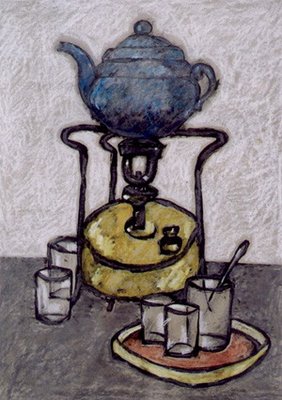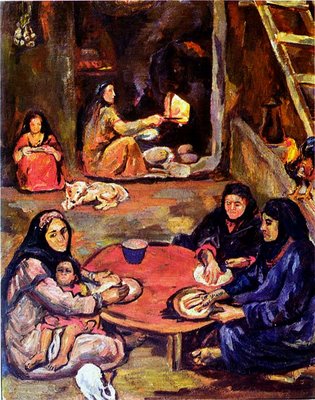Commentary on Egyptian Politics and Culture by an Egyptian Citizen with a Room of Her Own

Monday, October 30, 2006
Monday, October 16, 2006
Monday, October 09, 2006
The Magnificent Sharafantah
 Though he never played a leading role, and he never attained much fame, I will always love Muhammad Kamal al-Masri (1886-1958). In every film I’ve seen him in, he acts his supporting roles with such gusto, skill, and evident fun that it’s impossible not to be taken in by his charm and naturally comedic face. The first time I saw him was in his final film, ‘Afreetat Ismail Yassin (1954), where he played the loony eccentric who dons furniture covers as capes to keep his clothes clean, with little ribbons running down the front of the cape (for style, naturally). I laughed out loud, envying such an absolutely ridiculous and brilliant idea!
Though he never played a leading role, and he never attained much fame, I will always love Muhammad Kamal al-Masri (1886-1958). In every film I’ve seen him in, he acts his supporting roles with such gusto, skill, and evident fun that it’s impossible not to be taken in by his charm and naturally comedic face. The first time I saw him was in his final film, ‘Afreetat Ismail Yassin (1954), where he played the loony eccentric who dons furniture covers as capes to keep his clothes clean, with little ribbons running down the front of the cape (for style, naturally). I laughed out loud, envying such an absolutely ridiculous and brilliant idea!The Cairene al-Masri was a born performer. He started acting at an early age, and later joined the theatre troupes of Salama Hegazy and Sayed Darwish. This vaudevillian milieu, so rich in turn of the 20th century Egypt, was nicely portrayed in Habib al-‘Umr (1947), where Masri plays an entertainer with the lively troupe led by Farid l’Atrache. “Sharafantah” is the name of a theater character that al-Masri once played on stage, a name that he would later adopt as his professional moniker.
 Something about Sharafantah’s malleable face makes me giggle, and it’s not just the curled moustaches. It must be how swiftly the face morphs from serenity to wild anger, as it did in Miss Mama (1949), when a perfectly cordial barbering session ends with the irate Sharafantah threatening the terrified Muhammad Fawzi with a very sharp knife. But predictably, my favourites are the two classics, Salama fi Khayr (1937) and Si Omar (1941). Before this brilliant collaboration with Naguib al-Rihani, the two were actually on very bad terms. But luckily for devotees of Egyptian cinema, reconciliation ensued and spawned an unforgettable comedic duo.
Something about Sharafantah’s malleable face makes me giggle, and it’s not just the curled moustaches. It must be how swiftly the face morphs from serenity to wild anger, as it did in Miss Mama (1949), when a perfectly cordial barbering session ends with the irate Sharafantah threatening the terrified Muhammad Fawzi with a very sharp knife. But predictably, my favourites are the two classics, Salama fi Khayr (1937) and Si Omar (1941). Before this brilliant collaboration with Naguib al-Rihani, the two were actually on very bad terms. But luckily for devotees of Egyptian cinema, reconciliation ensued and spawned an unforgettable comedic duo. The two films are based on identical gags, where the put-upon simple clerk played by al-Rihani is mistaken for a prominent and monied personage. Sharafantah, of course, plays the suspicious snoop who calls the bluff. As with so many flicks of that era, both films are conservative, crude morality tales about the perils of class mixing, at a time when political ferment and social transformations were unsettling the established order in Egypt.
But as comedies, they work beautifully. I enjoy Salama fi Khayr slightly more than Si Omar, mostly because of how much Salama (al-Rihani) and his uptight schoolteacher neighbour Bayoumi Morgaan (Sharafantah) revel in hating each other. It all starts when Salama, sitting down to a warm meal prepared by his kindly wife (a young Fardous Mohammed), is outraged by a huge chunk of ceiling that falls smack in the middle of his soup, courtesy of the incessant banging in Bayoumi effendi’s upstairs apartment. It’s all downhill from there, as both trade the most—how shall we say?—candid and pungent epithets (“you lowly dog!” “you shameless liar!”) Clearly, it’s much funnier in Arabic.
 So during this Ramadan, which in its Egyptian version has come to mean not simply heightened spirituality but also cultural appreciation, I’d like to remember and esteem the great Sharafantah, for all the joy and laughter he brought to so many generations of film-lovers, for all the energy he brought to his roles, and for his positive inimitability.
So during this Ramadan, which in its Egyptian version has come to mean not simply heightened spirituality but also cultural appreciation, I’d like to remember and esteem the great Sharafantah, for all the joy and laughter he brought to so many generations of film-lovers, for all the energy he brought to his roles, and for his positive inimitability.*Poster of Si Omar found here, photo of Sharafantah from Mustafa Darwish, Dream Makers on the Nile (1998).
Monday, October 02, 2006
Subscribe to:
Comments (Atom)





